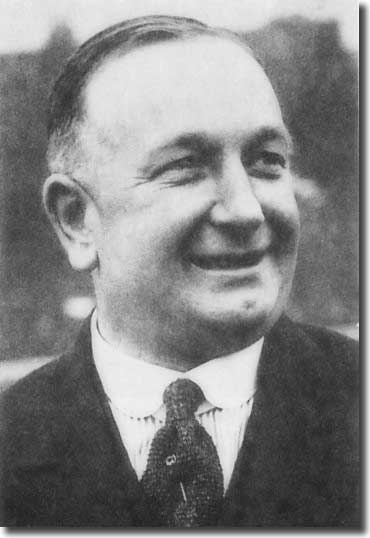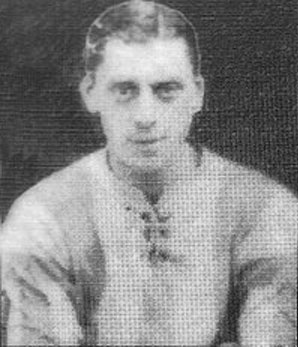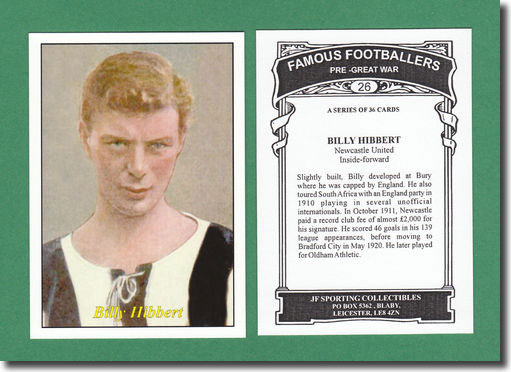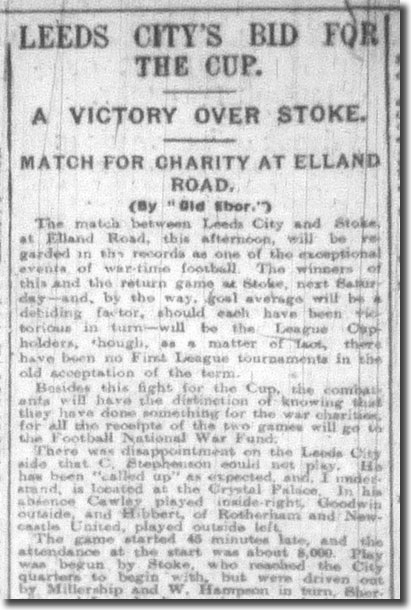 |
 |
 |
 |
 |
 |
 |
 |
 |
Unofficial League Championship Play Off First Leg - Elland Road - 10,000
Scorers: Hibbert, Peart
Leeds City: T Hampson; Millership, W Hampson; Hewison, Sherwin, Lamph; Goodwin, Cawley, Peart, Price, Hibbert
Stoke: Peers; Milne, Twemlow; Jones, Parker, Turner; Harrison, Whittingham, Howell, Herbert, Bridgett
Chapman came within a whisker
of leading the Peacocks to promotion in 1914, a couple of
years after succeeding Frank
Scott-Walford as manager at Elland Road. His first task after
taking on the role had been to secure City's re-election to the
Football League, which he did with energy and assurance. Thereafter,
following the judicious acquisition of some high profile signings
like Evelyn Lintott, Billy
Scott and Jimmy Speirs, he quickly moulded his players into
a competitive and high class outfit and in
1915 they finished fourth, just a couple of points short of
promotion. The advent of war in August 1914 effectively brought
an end to Chapman's dreams of the First Division, but City flourished
during the war years. In 1916, they won the Subsidiary tournament of the Midland Section,
finishing top of the full Midland Section a year later and retaining
that title in 1918. By then, Chapman had bid a temporary farewell
to the club, taking up a managerial position at a munitions factory
at nearby Barnbow in the summer of 1916. City's retention of the Midland title in 1918 put them in contention
for further honours. The previous October, it had been mooted that the
winners of the Midland Section should meet the top team in the Lancashire
Section over two legs, home and away, for the right to the unofficial
title of league champions. The arrangement had been formalised in February,
with the proceeds from the games earmarked for the National Football War
Fund. Leeds City had developed into an outstanding side during the
war and their success in 1917/18 was due in the main to their
goalscoring achievements - they returned a formidable 75 goals
from their 28 games. They had been in outstanding form all season, losing just four
times since mid-September. They came into the game on the back
of two goalless draws with Bradford City in the Subsidiary tournament,
but these were the only occasions when their attack had been denied
in a glorious campaign. Leeds had managed to hold onto pre-war players like Tommy Lamph
and Arthur Price and reinforced the team with wartime guests such
as Billy Hampson, Clem Stephenson,
Jack Peart, Bob Hewison and Harry Sherwin. Aston Villa inside-right
Stephenson had been the star of the season for City, though he
missed the two play off games, being unable to get away from his
duties with the RAF at Crystal Palace. The man the Peacocks brought in to offset their loss was 33-year-old
Newcastle forward Billy Hibbert, who had been playing for Rotherham
County. Hibbert had won an England cap against Scotland in April
1910. Hibbert was accommodated on the left wing, with Corporal
P J Barrett dropping out of the eleven. Tom
Cawley moved from outside- to inside-right in Stephenson's
stead, and Ernie Goodwin was recalled to play outside him. The
only other change in the eleven saw Welshman Harry Millership
return to partner Billy Hampson at full-back. Millership replaced
Hampson's brother Walker,
while another member of the Hampson clan, Tommy,
continued to keep goal. The unrelated Jack Hampson was missing
through injury, and in his absence Bob Hewison continued to captain
the side. City's opponents in the two-legged final were Lancashire Section
champions Stoke. The Potters had come up strongly on the rails
to overtake long time leaders Liverpool by dint of a superior
goal On 23 February, Liverpool had enjoyed a three-point advantage
over Stoke with four games left to play. They also possessed a
superior goal average, though the Potters had a game in hand.
The two teams were pitched against each other twice over the fortnight
that followed, but Liverpool, having dropped just eight points
in twenty-six games, went into the fixtures in highly confident
mood. The first game at Anfield ended 1-1, but Stoke then won 3-1 at
the Victoria Ground to move to within a point of their rivals,
though their goal average was still inferior. On 16 March, while Liverpool were being held to a 1-1 draw at
home to Bury, Stoke hammered Burnley 9-0 and thus drew level with
their rivals. They retained their game in hand and crucially their
goal average was now superior. Both sides were successful in their
fixtures the following week. Stoke had the luxury of going into their final fixture, at home
to Rochdale on 27 April, knowing that even a 2-0 defeat would
leave them champions by virtue of goal average. In the end, they
lost 2-1, and it was enough to take the title. The Staffordshire side had been in spectacular goalscoring form
all season with a goals record of 109 against 27. Their results
included 16-0 and 8-1 defeats of Blackburn Rovers, as well as
the 9-0 thumping of Burnley and a 7-0 thrashing of Oldham. Top scorers for the Potters were inside-left Billy Herbert and
centre-forward Harry Howell, who had amassed 28 goals apiece.
In the crucial defeat of Burnley, Howell had scored a hat trick
with Herbert getting a brace. The Stoke line up included three
Wolves players in Welsh international goalkeeper Teddy Peers,
winger Billy Harrison and Howell. They also had Arthur Bridgett
back on their left wing. Stoke's form had dipped in the end of season Secondary Competition,
with just two wins from six games, though that included a 6-0
trouncing of local rivals Port Vale. The resilience they showed
earlier when chasing down Liverpool marked them out as a side
to be reckoned with. Leeds City had home advantage in the first leg, staged at Elland
Road on 4 May. The visitors kicked the game off some 45 minutes
late, with Stoke the first side to show though City full-backs
Harry Millership and Billy Hampson repulsed their early thrusts
with some good support from Lamph and Sherwin. Then Leeds took up the running strongly, with Hibbert slotting in smoothly,
as reported by the Mercury: 'The City struck while the iron was
hot. They made the pace a strong one at the start, and the lovely understanding
between Peart, Price and Goodwin repeatedly promised the downfall of the
Stoke defence.' One movement by Peart, Price and Hibbert was only stayed
by an offside decision and then Peart took Price's pass to launch an effort
which many supporters thought had entered the Stoke net, though it actually
shaved the outside of the post. After Lamph cleverly checked Howell's thrust for Stoke, referee
J H Palmer of Nottingham had to City reaped the reward of their high tempo early burst when they
opened the scoring after ten minutes. The decisive moment came
following a series of attacks featuring Peart and Cawley. The
latter failed to get his foot properly to the ball a couple of
yards from goal when he was found by Goodwin's centre. The same
man then fired against the crossbar and despite several attempts
by goalkeeper Teddy Peers and his colleagues to clear, the ball
dropped nicely for Hibbert to nod home. Almost instantly, City came close to increasing their lead, but
after a full-blooded attack Peart hammered his shot over the bar. That was the signal for Stoke to push hard and City keeper Tommy
Hampson was forced into a save by Harrison, though it was a straightforward
enough shot which he gathered safely. When Howell got away in
another move, it came to nothing after a melee in which Bob Whittingham
and Billy Hampson ended up splayed on the turf after a fierce
collision. There was a lengthy delay in proceedings before the
referee restarted play with a free kick to Leeds. Minutes later Harrison tried another long range effort for Stoke,
which was deflected for a corner and then Bridgett was wayward.
Then City had cause to be thankful to Welsh full-back Harry Millership
for preventing the equaliser. Whittingham received the ball after
a corner kick was cleared and he gave the ball out to Harrison
who quickly retuned it. Whittingham snapped up the pass brilliantly
and got in a goalbound shot but Millership got his head in the
way of what looked a certain goal. With Stoke trying everything they knew to force their way onto
the score sheet, it was Leeds who were next to score, doubling
their advantage as the game reached the half hour mark. When Peart
managed to break clear on his own, Alec Milne might have cleared.
but Peart got the better of him and then beat Billy Twemlow, whose
challenge was sadly lacking. The centre-forward beat Peers from
short range with an accurate finish. The Stoke keeper was a busy figure for the next few minutes,
having to save a low shot from Cawley and then another effort
from Lamph. In between these chances, one Stoke assault ended
with a foul just outside the Leeds penalty area; happily the resultant
free kick came to nothing. The game reached half time with the Peacocks retaining a two-goal advantage
after a fast and energetic forty-five minutes. 'Old Ebor' reported in
the Yorkshire Evening Post: 'The pace of the first half had been
exceptionally fast, and the players had neither spared themselves nor
each other, though the play had not been by any means rough. It was now
largely a case of stamina, though the Leeds The Mercury commented: 'Stoke stuck to their guns grimly on Saturday,
and, indeed, rallied so strongly after an exhausting first half, that
the stamina of the City defence was rarely tested. In their long and dour
fight for a recovery, however, Stoke lacked the winning quality of finish.
Their admirably conceived movements were rarely pushed to a vital position.
They forced five corners in fifteen minutes, just after the interval,
two of them so superbly placed by Harrison that City had real cause to
be anxious; but the skill they showed in midfield was missing here, as
in all their efforts. 'It is true they were up against a very clever pair of backs. Millership
generally seemed to find time to prevent a full development, and W Hampson
always cleared with certainty; but their midfield cleverness ought to
have produced more effective positions for their marksmanship. Apart from
the two flag kicks by Harrison, cleverly cleared by T Hampson, a couple
of grand drives by Howell and Parker and one or two good attempts by Bridgett
and Whittingham, the City keeper was never really tested.' After the resumption, it was Stoke who started the better, winning
a corner; Tommy Hampson had to be on his mettle to gather Harrison's
centre, though he did so with some assurance. There were two more
Stoke flag kicks, and another telling centre from Harrison, but
the City defence held out resolutely. When Harrison bore down
in another attack, goalkeeper Hampson came out swiftly and emerged
from the confrontation with the ball before then clearing a follow
up shot by Bridgett. According to Old Ebor, 'Stoke were persistent in their pressure for a
time, their half-backs and right wing forwards playing smartly, but they
were always up against a good defence in which Hewison, Lamph and W Hampson
were frequently to the fore, though as a matter of fact, there was no
personal failure on the City side. The City forwards were the more aggressive
and combined set of the two, Cawley and Peart playing particularly well.' The final ten minutes were characterised by almost relentless
pressure from the visitors but City were in determined mood and
put up a sterling rearguard action to hang on to their hard won
advantage. The Yorkshire Post: 'There was no question as to the title of
Leeds City to the victory which they gained over Stoke in the first of
the finals for the Association League Cup on the City ground on Saturday.
They had the smarter and more enterprising set of forwards, and if honours
were fairly even in the middle division, Leeds were more reliable at full-back,
and gave their custodian more support than Peers got from the two men
immediately in front of him. 'Harrison was the only real class forward on the Stoke side, his runs
down the right wing causing more trouble to the City defence than any
other movements. In one point only could Stoke claim to be superior, and
that was in stamina. The match was played at a surprise pace in the first
half, and this pace seemed to be borne better by Stoke than by the home
team. At the same time there was never any appearance of a victory for
the Staffordshire representatives. There was an attendance officially
returned at ten thousand, the receipts, which go to the Football National
War Fund, amounting to £435. 'In the second half of the match, Stoke could claim to have the balance
of play, but there was little cohesion among their forwards, and Leeds
always seemed to be the more dangerous when they neared goal. The Leeds
halves and full-backs kept very cool headed under pressure, Hewison and
W Hampson in particular being most industrious in repelling raids, such
as there were. The pace palpably tired both sides, but Stoke finished
the fresher of the two. There will doubtless be a big struggle in the
return match at Stoke next Saturday, but meanwhile Leeds City have made
a useful start towards winning the League Cup.' It was a decent lead to take to the Potteries
for the second leg. The Leeds Mercury sounded a cautionary
note, however, saying, 'There could be no question as to the superiority
of Leeds City over Stoke in the first of the League Cup final matches
at Leeds on Saturday, and their two goals lead must be considered a useful
one. It is quite conceivable, however, that Stoke will improve their form
under home influences. Leeds City's task is by no means over.' The
First World War came at a bad time for Leeds City Football Club;
there's never a convenient moment for a catastrophe of the proportions
of the Great War, but the four years of strife in Europe certainly
robbed City manager Herbert
Chapman of an outstanding opportunity of putting the West
Yorkshire club on the football map.
The
First World War came at a bad time for Leeds City Football Club;
there's never a convenient moment for a catastrophe of the proportions
of the Great War, but the four years of strife in Europe certainly
robbed City manager Herbert
Chapman of an outstanding opportunity of putting the West
Yorkshire club on the football map. average.
average. counsel
one of the other visiting players to keep his cool after a show
of temper.
counsel
one of the other visiting players to keep his cool after a show
of temper. City
lead was formidable to say the least.'
City
lead was formidable to say the least.'